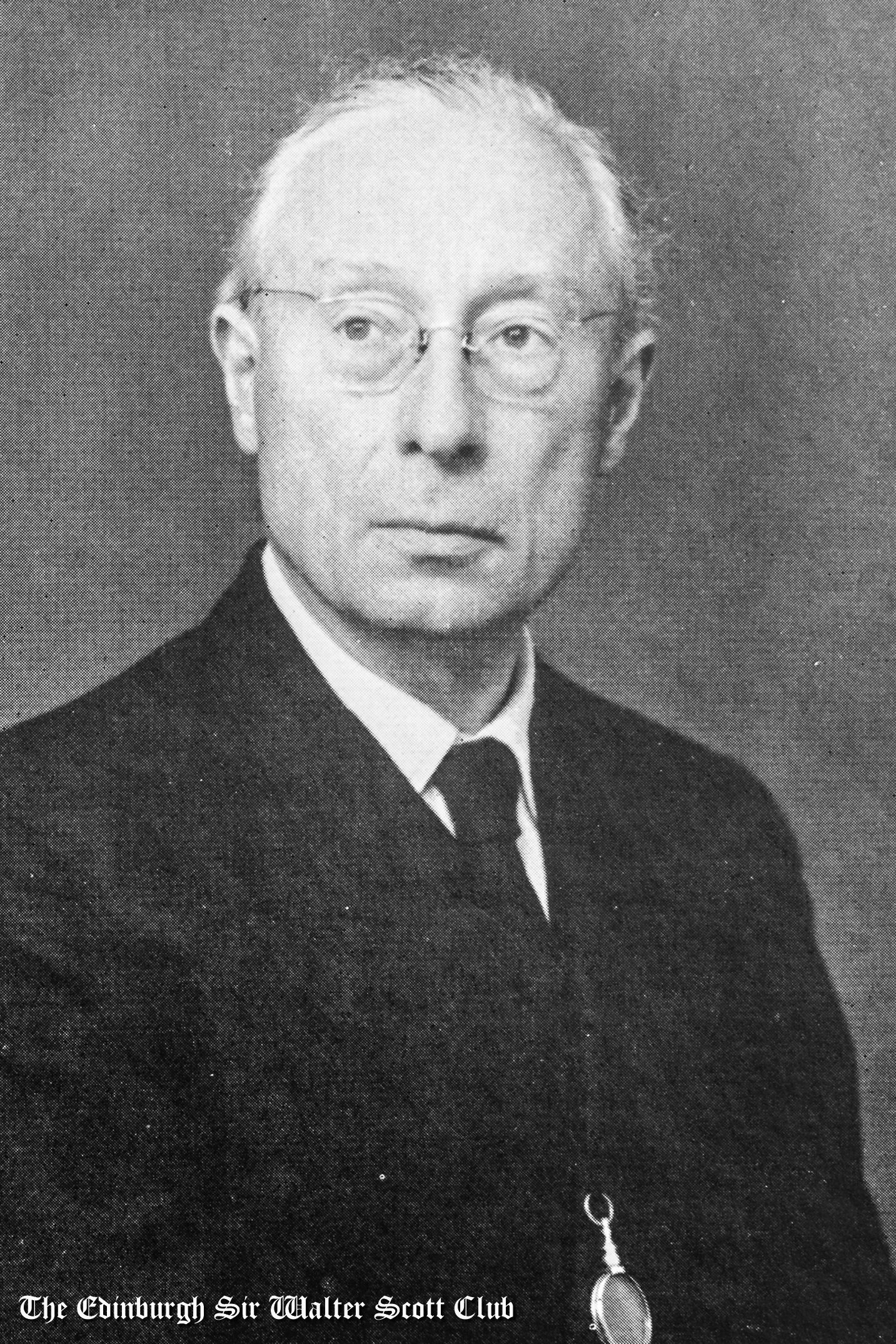1957
Our President in 1957/58 was:
Arthur Melville Clark
He proposed the Toast to Sir Walter at our 50th Annual Dinner on Friday 7th March 1958 in The North British Hotel
Download the [transcript] or read the [bulletin]
Summary of the Speech:
1. Tribute to Monsignor Knox:
Clark opens with a heartfelt remembrance of Monsignor Ronald Knox, who had been due to deliver the toast but passed away the previous summer. Clark recalls meeting Knox 35 years earlier and praises his charm, modesty, and intellectual originality.
2. Main Theme – Scott and Shakespeare:
Clark's central theme is a bold comparison between
Sir Walter Scott and William Shakespeare, which he humorously frames by referencing Scott’s own humility (“not fit to tie his brogues”). Clark argues the comparison is not absurd, and even suggests Scott surpasses Shakespeare in some ways.
3. Scott’s Early Love of Shakespeare:
Clark recounts Scott’s childhood fascination with Shakespeare, beginning at age four with a performance of
As You Like It, and developing through reading, family encouragement, and theatrical play. Scott’s literary admiration was lifelong, as evidenced by:
- A bust of Shakespeare at Abbotsford.
- Quotations from Henry IV, Macbeth, and Richard II in Waverley and his other works.
4. Shakespearean Influence on Scott’s Writing:
Clark traces deep stylistic and thematic connections:
- Scott’s novels are rich in Shakespearean quotation and allusion.
- Both authors shared a “magnificent carelessness” and wrote fluently without over-revising.
- Both showed a “fountain-like” overflow of creativity, favouring storytelling over philosophical doctrine.
5. Contrast in Purpose and Tone:
Clark challenges the idea that Shakespeare (and by extension, great literature) must offer moral instruction. Both Scott and Shakespeare, he says, were entertainers, not preachers—content to “hold the mirror up to nature.”
6. Humanity, Humour, and Realism:
Clark draws attention to:
- Scott’s blending of tragedy and humour.
- His emotionally grounded characterisation (e.g. Effie Deans and Dumbiedikes).
- How scenes like the death of the old laird in Old Mortality rival Shakespeare in comic pathos.
7. Supernatural Elements:
Clark examines Scott’s The Bride of Lammermoor, comparing it to
Romeo and Juliet but with deeper fatalism and supernatural atmosphere—"prophecy and omen... brooding over the inevitable."
8. Depth of Characterisation:
- Shakespeare is lauded for subtlety, but Scott, Clark argues, created more emotionally engaging characters.
- Jeanie Deans is selected as more endearing than any of Shakespeare’s heroines, including Cordelia and Rosalind.
9. Portrayal of Social Classes:
- Clark contrasts Shakespeare’s condescending treatment of “plebeians” with Scott’s dignified portrayal of humble folk.
- Characters like Dandie Dinmont, Edie Ochiltree, and Davie Gellatley are shown with complexity and respect, never as mere comic relief.
- Clark claims Scott’s working-class characters are more believable and more moving than Shakespeare’s gravediggers or fools.
10. Final Argument:
Clark concludes that Scott, like Shakespeare, portrayed life in its full range—romance, realism, poetry, pathos. But Scott, he believes, did so with even greater tenderness, insight, and relevance to the lives of ordinary people.
Noteworthy Passages and Quotes:
- “Scott and Shakespeare... are content to hold, as ’twere, the mirror up to nature.”
- “Scott’s is too true not to be good; Shakespeare’s is perhaps too good to be true.”
- “He never drew a poor man as a clown just because of his class...”
- “Even daft Davie Gellatley is not just a joke.”
Interesting Points for Modern Readers:
- Clark’s address is among the most ambitious literary comparisons made in a Scott Club toast.
- His critique of Shakespeare’s treatment of common folk anticipates more modern class-conscious readings.
- The speech is unusually long and dense, bordering on a full literary essay—suggesting Clark’s serious scholarly intent.
- It reflects the mid-20th century tension between entertainment and edification in literature.
Download the [transcript] or read the [bulletin]

Subsidiary Toasts
The toasts of “The Queen” and “The Royal Family” were duly honoured.
Thereafter Mr C. J. D. Shaw, Q.C., Dean of the Faculty of Advocates, proposed the toast of “The Imperial Forces,” to which Air Vice-Marshal P. D. Cracroft, C.B., A.F.C., R.A.F., replied.
“The City of Edinburgh” was proposed by Mr W. F. Arbuckle, C.B., and replied to by Bailie Walter Prowse (representing the Lord Provost).
The toast of The Chairman was proposed by The Rev. Murdo Ewen Macdonald, B.D.


